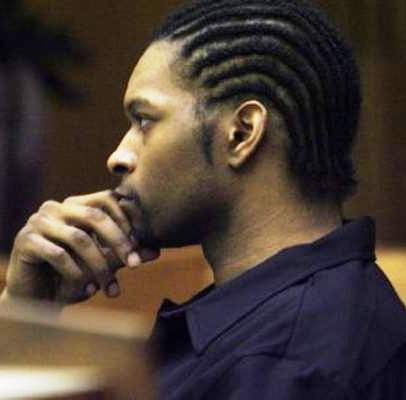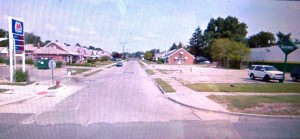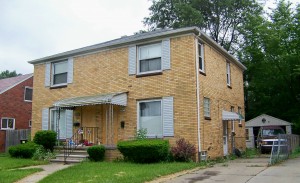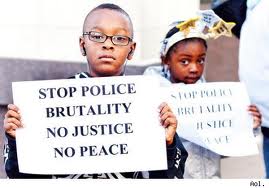Exclusive VOD interview
By Diane Bukowski
DETROIT – Exclusive interviews with eyewitnesses to the arrest of Jason Gibson in 2009, which police testified about Mar. 18, during his trial for the murder of Officer Brian Huff last year, completely contradict the officers’ testimony.
Long-time friends of his also contradict the portrayal by the officers and the daily media of Gibson as a vicious, violent animal who could only be restrained by three beefy cops.
“My family, my sister, my children, they love Bird,” said Lawana Murphy. “He is a lovable person. He really loves his mom and dad, and looks after his two-year-old daughter Majaisia. He looked out for everybody. I never heard him say ‘no’ to anyone’s request for help, and if he did, he would come back later to help. I still miss him.”
Others in the group who knew “Bird,” his nickname, for years, agreed.
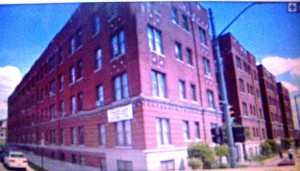
Colony Arms Apartments, site of Jason Gibson's 2009 arrest, which has not resulted in a trial or conviction
“He is a cool guy, a good guy who would keep you laughing,” said one friend. “He had your back 100 percent. If you were hungry, he got you food. If he had a quarter, he would give you 15 cents and keep a dime for himself. He liked to rap, he was more like a poet. He had a big heart.”
Everyone present at the interview said they had never seen “Bird” act violent towards anyone, including police. (The names of the young men in the interview are being withheld to protect them from retaliation.)
“The reason the cops say he’s violent is because he’s a big person,” said another young man. “But he wouldn’t fight. He wouldn’t even argue with his friends, he wouldn’t get upset about anything.”
While tall and broad-shouldered, Gibson is actually medium-built, unlike many of the cops who testified against him.
Murphy said, “He doesn’t show his feelings, he’s always calm.” Her portrayal of Gibson was identical to his demeanor in court, polite, reserved and quiet, showing no reaction to negative testimony by the officers. When he sees his mother and father, who have been there every day of the first three weeks of his trial, he smiles slightly and appears appreciative of their presence.
Gibson was arrested in front of an apartment building at 9333 E. Jefferson in November of 2009. Four officers testified about the arrest Mar. 18 over the objections of Gibson’s attorney, Susan Reed. The jury was never even told that Gibson has not been tried, let alone convicted, in that case.
(See following story for account of trial during the week of Mar. 17, and VOD article at http://voiceofdetroit.net/?p=2477 for exclusive story on the November hearing during which Judge Cynthia Gray Hathaway allowed Assistant Prosecutor Thomas Trzcinski to present testimony regarding “prior acts.”)
Several of those present during the interview witnessed the arrest in November, 2009. They said practically everyone in the building came out while it was happening. Many younger individuals live there with their families, including small children. Gibson lived there as well.
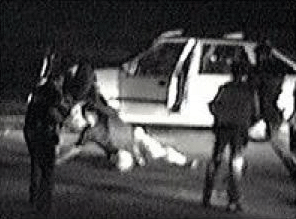
Rodney King beating in LA; police in Jason Gibson's trial have used the same arguments against him that LA police used against King, portraying him as a brute that it took numerous cops to subdue.
“There were only two officers at first,” one witness said. “They were in plainclothes, they didn’t say ‘police,’ they didn’t show their badges. They were dressed in all black. He was walking down the sidewalk and they grabbed him from behind and he turned around. They tackled him and started beating him up. Then police cars started coming from everywhere. Everybody came out of the building, and they pulled their guns out on us and told us to back up.”
Another witness said the cops threatened to shoot the bystanders.
“I never heard them read him his rights, they never do,” said the witness. “They beat him up real bad.”
Reed was charged with three counts of weapons possession in that case, which was before Judge Gray-Hathaway. Cops did not say they found weapons on his person, but found a gun on the ground. However, the arrest, while previously listed on the Michigan State Police ICHAT (Internet Criminal History Access Tool) report, is no longer on ICHAT.
A witness to an earlier arrest on Joann Street near Seven Mile told a similar story.
“On Bird’s way back from the store, there was a car riding down the street with no lights on,” he said. “A big white guy jumps out first. In my hood, I know that’s the police. But then a dude with a mask jumps out. Bird is yelling, ‘Call the police, they’re robbing me, they’re robbing me.’ The dude was beating him up. They kicked him for a while. They messed up his back; that’s why he walks with a slump now.”
He said the cops asked, “Well, why did he run? We gotta take him now because we put our hands on him.”
Another young man said, “The police department, especially the Ninth Precinct [now the Eastern District, where Huff was assigned] has been crooked for years.”
A resident of the Schoenherr neighborhood where Huff died, and a former high-ranking official in police administration have said it was well known that the duplex on Schoenherr was a police-operated drug house. The resident said it was known to be a “weight house” where police stored drugs for later sale, not a house that people frequented to buy drugs.
A well-known police drug scandal surfaced in the Fifth Precinct, now also part of the Eastern District, in 1999.
“Six Detroit police officers were indicted on charges of robbing and beating people on the streets of their precinct and hoarding money, guns and drugs from illegal searches of suspected drug houses,’ reported the Times Wire. “The officers were charged with federal civil rights conspiracy, which carries a maximum sentence of up to 10 years in prison and a $250,000 fine. Three of the officers are also charged with taking bribes for protecting drug traffickers and possessing drugs and the equipment used to distribute them, such as scales for weighing. The six worked in the 5th Precinct, a hotbed of police corruption in a force rocked by scandal.”
The officers charged were Rodney Rice, Irvin Lamont Upshaw, Larone Cook, Mark Heath, Antonio Carlisli, and Christopher Cole. At last check, parts of the case are still pending

